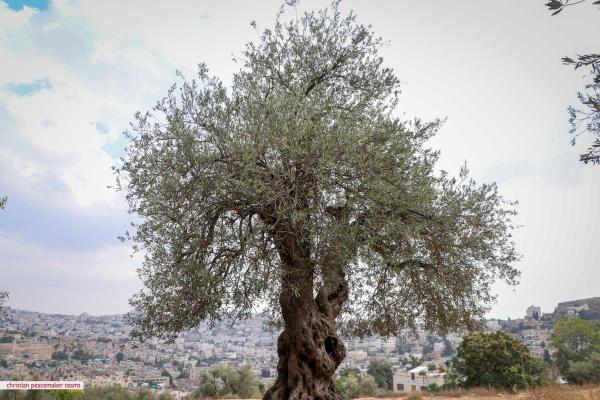
Ancient olive tree near the Tel Rumeida settlement in Al-Khalil/ Hebron
It’s autumn in Palestine. The olive trees—some of them centuries old—stand ready to provide Palestinian farmers and families another season’s worth of their precious crop. Precious in at least three ways:
- About 80,000 households depend directly or indirectly on olive tree products, including table olives, olive oil, and the excess olive wood. Most of the output is used by Palestinians themselves, but olive products are also one of the few sustainable exports from Palestine to the world.
- The trees themselves are a direct legacy of many generations of Palestinian care for their land and its fruits. Almost half of Palestine’s agricultural area is devoted to olive trees.
- The annual harvest involves intense work at the best of times—harvesting one average-sized tree can take one person two or three hours—but these are not the best of times. The Israeli government and its settlement policies complicate farmers’ lives in numerous ways, separating many farmers from their groves and granting only limited access by permits to those lands. The permits may not allow enough time to complete the harvest. In some places, tractors are not allowed. Farmers have no defense against settler violence, sabotage, pollution, and theft. Israeli forces destroy trees to build roads, settlements, and clear-fire zones for military use.
In al-Khalil (Hebron) and the South Hebron Hills, the dedication of Palestinian olive growers to their work, and the challenges imposed by Israeli occupation are piercingly evident. By invitation, CPT assisted seven Palestinian families with the harvest, picking olives and monitoring settler and military activity.
During these visits, we saw entire families involved with the olive harvest—some climbing the trees or reaching from ladders to pick or rake the olives, which fall to the tarps surrounding the trees. Others sit nearby, separating olives from twigs and leaves; others prepare meals and drinks for the harvesters.
As we pass the time together, they explain their situations. The families whose groves adjoin illegal settlements have particular challenges: “The Israeli settlers took a lot of these trees here,” said one Palestinian. “They opened the sewage pipe from [the illegal settlement next door] into our land and damaged most of the trees.” Another olive farmer, a retired school director whose property is squeezed between two Israeli compounds, summed up her view of the situation: “We are not here to make anyone sad. We are not here to make anyone happy. We are here…because we are here.”
Find a full UN report on the olive harvest season here.



